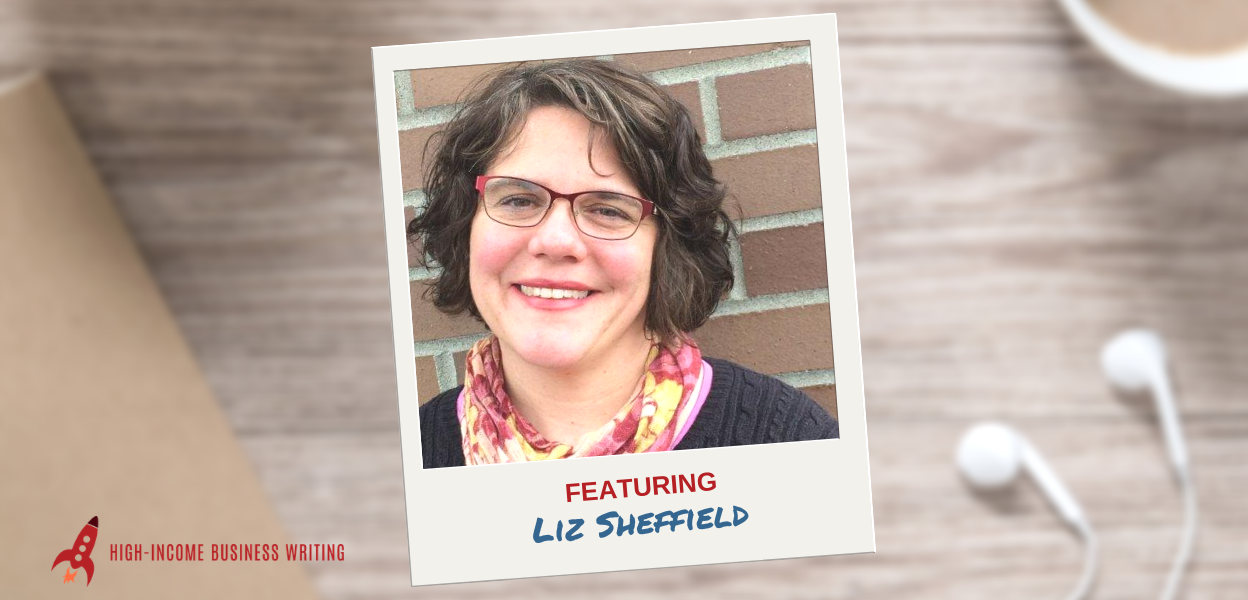Before we get to today’s interview, I wanted to let you know that I have a few open slots in my coaching group for writers who are already earning at least $5k/month but want to get to the six-figure level (or the part-time equivalent).
We’re going to work closely together this year to get you to six figures without proportionally increasing your workload.
If you’d like to learn more, send me an email (ed@b2blauncher.com) … put “DOUBLE” in the subject line … and I’ll reply to you personally.
One of the pitfalls of working for yourself is that you often get so busy, you forget to invest in yourself and your professional development.
Let’s face it, there’s only so much time every week. But if you don’t take time to “feed the goose,” you’ll soon have no golden eggs.
In this interview, Liz Sheffield explains why she’s a huge proponent of investing in yourself and your freelance business. Liz is a freelance writer who works with companies that market and sell to human resources departments.
As an HR professional herself, she understands the benefits and advantages of taking time to improve your knowledge and skills. And as a freelancer, she also understands the challenges we face in finding the time and resources to do this consistently.
In this conversation, she gives an overview of the many professional development opportunities out there, including both paid and free options. She explains how to invest your time and money wisely. And provides tips on keeping up your skills and knowledge, even when you have no time to spare.
The notes that follow are a very basic, unedited summary of the show. There’s a lot more detail in the audio version. You can listen to the show using the audio player below. Or you can subscribe in iTunes to get this show delivered straight to the Podcasts app on your smart phone, tablet or iPod.


High-Income Business Writing with Ed Gandia
#173: Liz Sheffield on the Importance of Professional Development for Freelancers
Tell us about yourself and the work you do
Liz Sheffield has run her own copywriting business for almost seven years. She writes for clients that market to HR departments, so she’ll often write on topics such employee relations, employee engagement, staffing etc.
Prior to going solo, Liz spent 12 years in HR with Starbucks.
Why do you think professional development is so important for self-employed professionals?
Liz has always been a lifelong learner. Her background in training and development has shown her the value of professional development. At Starbucks, for example, she saw people move from barista to regional director with the assistance of professional development.
In her own career, she’s experienced a big jump in success every time she’s made a significant investment in herself.
Professional development has potential benefits that go beyond your own business. Your learning can also benefit your clients, prospects and potential partners.
It also marks you as a professional.
How do you define professional development?
Professional development doesn’t just include workshops, courses or coaching. It can also include joining a Facebook group in your niche, reading blogs, listening to relevant podcasts, reading books and attending free webinars.
Some professional development options cost money. But many of them are free.
Professional development can cover different categories of learning, such as:
- Improving your skills (e.g. writing)
- Improving your business
- Training and certifications in your target market
- Training and certifications in the target market of your clients.
What are some of the things you’ve done?
Liz recently completed Society for Human Resources Management (SHRM) certification. It was an intensive process that required a lot of studying and practice. She passed her test in July.
Since then, she landed a client partly due to having this certification.
Liz has also worked with an accountability partner for six months. They schedule regular calls where they brainstorm and share insights. This has also been very valuable.
How can you assess different programs and activities for quality and fit?
Liz suggests looking at three things:
1. Alignment
If you’re going to work with a particular person or organization, do some investigating. Follow them on social media, read what they’re publishing, go to their free events if you can.
You want to be sure that they’re in alignment with what you need.
2. Proof
Look for testimonials. See how their work has benefited others.
Also look to make sure that they’re delivering at the right level for you. Do you need something simpler? More sophisticated? More applied?
3. Internal ROI
You want to make sure you’re getting something in return for your investment of time and/or money.
A $25 book on taxes might easily pay for itself, for example.
By looking at ROI, you also encouraging yourself to implement what you learn. You have to take ownership of what you’ve learned to get the most out of it.
So when you invest in something, set goals for realizing results. Give yourself a tangible target.
What’s a good way to get started?
Start with something do-able. Set aside 30 minutes every week to learn something new. It doesn’t have to be a big commitment!
Play to your strengths. If you learn best by listening, for example, then a podcast might be better than cracking open a textbook.
It’s also a good idea to use a combination of delivery methods and topics.
For example, you can read a book, take a course and get an accountability partner at the same time.
The barrier to becoming a freelance writer is so low, it promotes a mindset of not investing in yourself.
You don’t see this as much in other businesses where you have to buy expensive equipment or purchase a franchise to get started.
Many professions require practitioners to complete a certain number of professional development hours each year to keep up their certification. This can be a good model to emulate.
Where can listeners learn more about you?
By the way … whenever you’re ready, here are 4 ways I can help you grow your freelance business:
1. Grab a free copy of my new book for writers who are NEW to freelancing.
It’s called “The 3 Magic Levers: How to Get Your Writing Business Off the Ground and Land Your First Paying Client.” — Click Here
2. Download a free copy of my book for ESTABLISHED writers/copywriters.
You’ll discover how to quickly and predictably reawaken dead leads, generate new client opportunities and convert not-yet-ready prospects into freelance writing clients. — Click Here
3. Join our “Get Better Clients Academy”
You’ll get a personalized action plan based on where you are today in your business. Plus all the tools, scripts, checklists, cheat sheets and templates you’ll need to escape feast-or-famine … grow your income … and land clients who love and respect you. — Click Here
4. Get your website DONE!
If you’ve been struggling to get your website done … or if you’re not happy with what you’ve got today… let my team and me build you a beautiful website for your writing business. We’ll do all the hard work! Email me at ed@b2blauncher.com … put “WEBSITE” in the subject line … and I’ll reply with the details.






